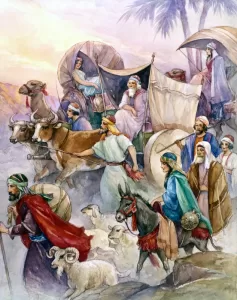Joseph and the Famine
47: 13-26

The famine was relentless. No food grew in Egypt or Canaan. The citizens paid for the grain that had been stored, but finally their money ran out. Joseph told them that if they would bring their livestock instead of money, he would exchange their livestock for grain. They followed that plan until Pharaoh owned all the livestock. To help the hungry people, Yosef proposed that they let the king of Egypt buy their land in exchange for grain. And just like before, Pharaoh ended up owning all the land in Egypt, and in this way the people of Egypt were reduced to slavery. Now that Pharaoh owned all of the land (except for the land of the priests), Joseph distributed seed to be planted as the famine finally subsided. The plan was that when a crop was reaped, the people would give one fifth of it as tax to Pharaoh. The other four-fifths they would keep for themselves. The people did not object and were grateful to Yosef for saving their lives.725
This process is something for which Yosef has been criticized. People say that he took advantage of poverty, closed on the mortgages and bought the land, but this is an unfair criticism of Joseph. To begin with, he was the agent of Pharaoh. None of this was for himself. He was not dishonest in any sense of the word and did not personally gain because of the famine. An illustration of this is the scarcity of, and demand for, uranium during World War II in America. When some men found that they had uranium on their properties (especially in Arizona), they were paid a lot of money for their land. Were they taking advantage of their government? I don’t think so. The law of supply and demand was at work. It seems to me that this same principle was at work in the land of Egypt. Yosef bought the land for the king of Egypt, and he enabled the people to live by providing grain to them. He couldn’t just give the grain away. If he did that, the whole world would have been at his doorstep. The result would have been chaos. It is reasonable to conclude that Joseph stayed within the law of supply and demand.726
Yosef has also been criticized for favoring his own family by providing them grain while everyone else had to pay for it. But it should be pointed out that the Israelites were guests of Pharaoh, and as such, were on completely different footing than the rest of the Egyptians. Besides, there was no possibility of their purchasing food because they had left their possessions behind them. They had been told by the Hyksos king not to be anxious about what they possessed in Canaan, and he promised that all the good of Egypt should be theirs. Pharaoh’s care of them was a matter of philanthropy, while a free gift of corn to the people would probably have resulted in chaos and anarchy.727
But the result of this four stage process was that everyone in Egypt became the economic slaves of Pharaoh. As long as the Hyksos and Joseph remained in power, the children of Isra’el prospered. But there would come a day when the Egyptians would overthrow the Hyksos and a new dynasty would come to power in Egypt (see my commentary on Exodus, to see link click Ag – Then a New King Who Did Not Know About Joseph Came to Power).



Leave A Comment